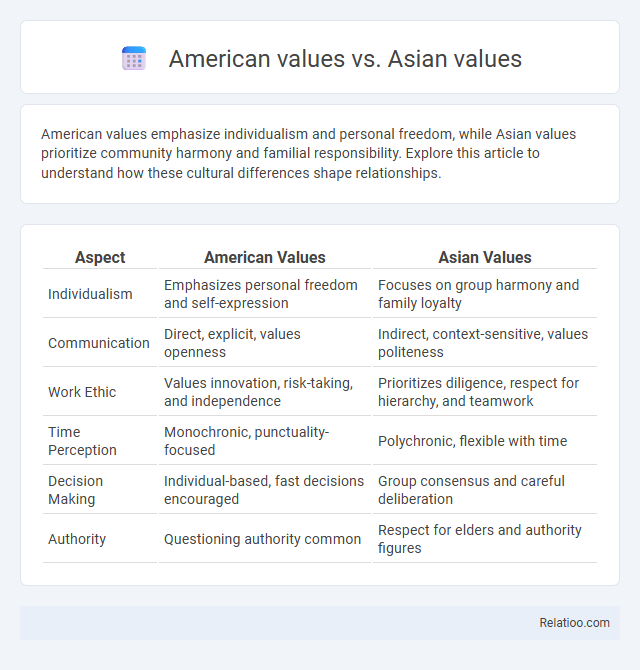American values emphasize individualism and personal freedom, while Asian values prioritize community harmony and familial responsibility. Explore this article to understand how these cultural differences shape relationships.
Table of Comparison
| Aspect | American Values | Asian Values |
|---|---|---|
| Individualism | Emphasizes personal freedom and self-expression | Focuses on group harmony and family loyalty |
| Communication | Direct, explicit, values openness | Indirect, context-sensitive, values politeness |
| Work Ethic | Values innovation, risk-taking, and independence | Prioritizes diligence, respect for hierarchy, and teamwork |
| Time Perception | Monochronic, punctuality-focused | Polychronic, flexible with time |
| Decision Making | Individual-based, fast decisions encouraged | Group consensus and careful deliberation |
| Authority | Questioning authority common | Respect for elders and authority figures |
Understanding American and Asian Value Systems
American values emphasize individualism, personal freedom, and equality, fostering acceptance and legal recognition of same-sex relationships as part of civil rights. Asian value systems often prioritize collectivism, family cohesion, and social harmony, leading to varied perspectives on same-sex relationships influenced by cultural, religious, and traditional norms. Understanding these contrasting value frameworks is crucial for navigating cross-cultural dialogues on LGBTQ+ rights and fostering mutual respect.
Individualism vs Collectivism
American values emphasize individualism, promoting personal freedom, self-expression, and autonomy in relationships, including same-sex partnerships. In contrast, many Asian cultures prioritize collectivism, valuing family cohesion, social harmony, and community approval, which often influences perspectives on same-sex relationships. The tension between individual rights and collective expectations shapes the acceptance and social dynamics of same-sex couples across different cultural contexts.
Approaches to Family and Community
American values often emphasize individualism and personal freedom in family and community dynamics, supporting same-sex relationships as a reflection of individual rights. Asian values typically prioritize collectivism, filial piety, and social harmony, which can result in more traditional stances toward family structures and same-sex relationships. Your understanding of these differing approaches helps navigate the cultural nuances influencing acceptance and support within families and communities.
Perspectives on Education and Success
American values emphasize individualism and self-expression, framing education as a pathway to personal achievement and diverse definitions of success. Asian values often highlight collective responsibility, discipline, and respect for authority, viewing education as essential for family honor and social stability. Your perspective on same-sex relationships may reflect these cultural values, influencing how success and acceptance are perceived within educational and social contexts.
Attitudes Toward Authority and Hierarchy
American values emphasize individualism and challenge traditional authority, promoting equality and questioning hierarchical structures. Asian values often respect authority and uphold hierarchical relationships, reflecting Confucian principles that prioritize social harmony and collective well-being. Attitudes toward same-sex relationships vary, with American perspectives tending to support LGBTQ+ rights as expressions of personal freedom, while some Asian cultures may be more conservative, influenced by traditional social hierarchies and familial expectations.
Communication Styles: Direct vs Indirect
American values typically emphasize direct communication styles, where clarity and explicitness are prioritized in conversations, especially regarding same-sex relationships. In contrast, many Asian cultures favor indirect communication, using context and non-verbal cues to convey messages subtly, reflecting collective harmony and respect for social hierarchies. These differing communication styles can impact the expression and acceptance of same-sex relationships, influencing how individuals disclose, discuss, and advocate for LGBTQ+ rights within their cultural frameworks.
Concepts of Freedom and Responsibility
American values emphasize individual freedom paired with personal responsibility, highlighting the right to self-expression and autonomy in same-sex relationships. Asian values often prioritize community harmony and social responsibility, balancing personal freedoms with cultural and familial obligations within the context of same-sex partnerships. Concepts of freedom and responsibility in these cultural frameworks influence the acceptance and support structures available to individuals in same-sex relationships.
Work Ethic and Professional Values
American work ethic emphasizes individualism, innovation, and merit-based achievement, fostering a competitive and results-driven professional environment. Asian values prioritize collective harmony, respect for hierarchy, and long-term commitment, often leading to group-oriented teamwork and loyalty within organizations. Same-sex relationships in professional settings highlight the importance of inclusivity, diversity, and equal opportunity, promoting workplace cultures that value authenticity and respect across different identities.
Religion, Spirituality, and Moral Beliefs
American values often emphasize individualism, religious freedom, and the separation of church and state, fostering diverse interpretations of same-sex relationships shaped by varying Christian denominations and secular perspectives. Asian values frequently prioritize collectivism, family honor, and traditional religious beliefs such as Confucianism, Buddhism, and Hinduism, which can influence more conservative views on same-sex relationships within many communities. The intersection of religion, spirituality, and moral beliefs in these contexts creates complex dynamics, where acceptance or rejection of same-sex relationships is deeply rooted in cultural narratives and interpretive frameworks.
Social Expectations and Cultural Adaptation
American values often emphasize individualism and personal freedom, encouraging you to express your identity openly in same-sex relationships. Asian values, rooted in collectivism and family honor, may present social expectations that prioritize conformity and discretion, challenging public acceptance of such relationships. Navigating these cultural adaptations requires balancing respect for traditional norms with your desire for authenticity and social inclusion.

Infographic: American values vs Asian values
 relatioo.com
relatioo.com